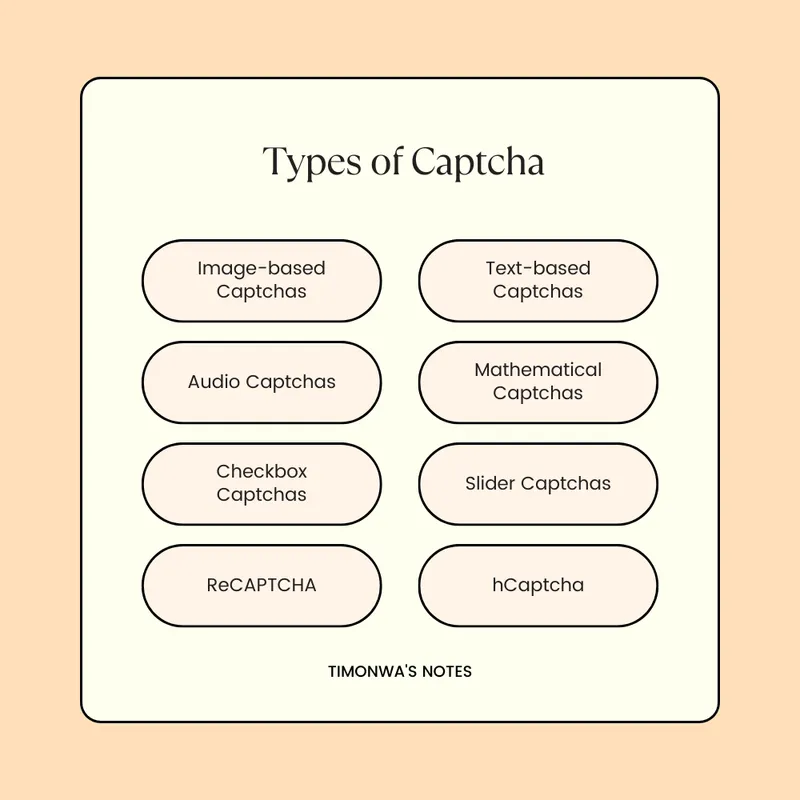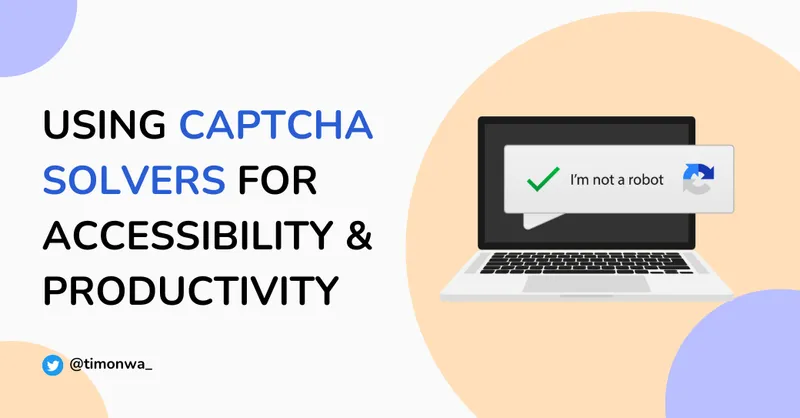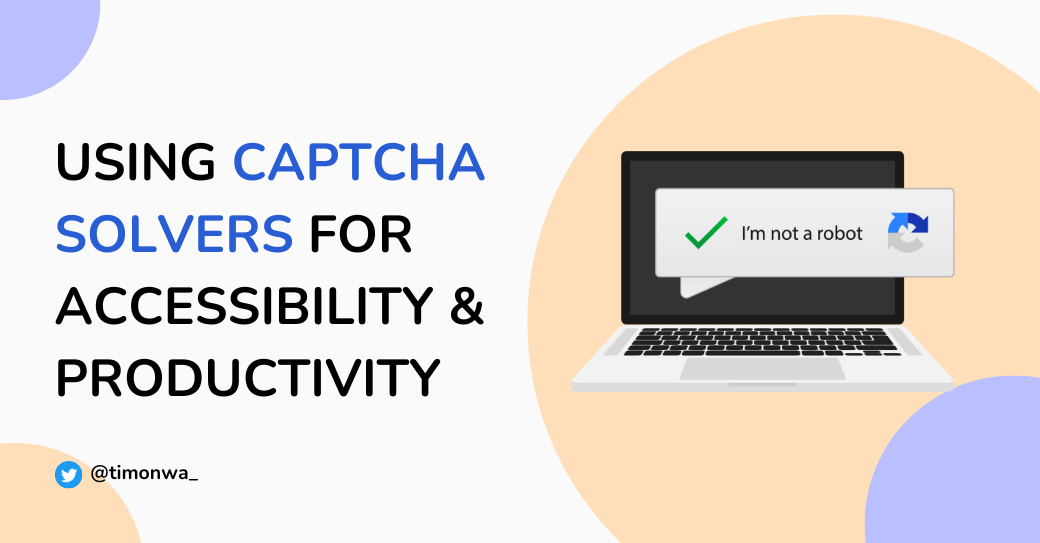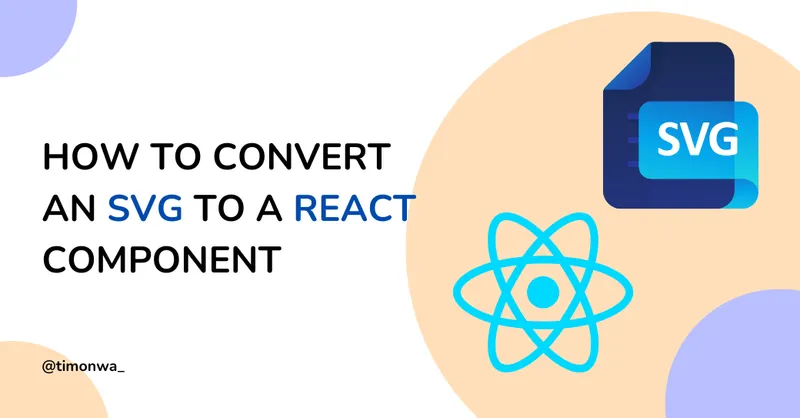Online security is of utmost importance in the digital age. Captchas, those familiar puzzles that require users to prove their humanity by solving challenges, play a crucial role in safeguarding websites from automated bots and malicious activities.
While captchas have undoubtedly contributed to web security, they often pose challenges for disabled users and professionals like Data Entry Operators, Market Researchers, and SEO Specialists.
This article, sponsored by Capsolver, sheds light on the accessibility issues and productivity hindrances posed by captchas and explores the potential of captcha solvers like Capsolver to create a more inclusive and efficient online experience.
What are Captchas
Captchas, short for Completely Automated Public Turing test to tell Computers and Humans Apart, is designed to differentiate between real human users and automated bots. These challenges may involve image recognition, distorted texts, or other interactive puzzles.
By solving captchas, users demonstrate that they are humans, preventing bots from accessing sensitive information or engaging in unauthorized activities.
Several types of captchas exist to differentiate between humans and automated bots. These captchas vary in format and challenges, each serving a distinct purpose in online security. Some common types of captchas include:
- Image-based Captchas: These captchas require users to identify and select particular objects within an image. Users might need to select all images containing a specific object, such as a car or a street sign.
- Text-based Captchas: These captchas present users with distorted or obscured text characters that must be deciphered and entered correctly. The distortion makes it challenging for automated bots to recognize the characters.
- Audio Captchas: In these captchas, users listen to an audio clip containing a sequence of numbers or letters and then type in what they hear. This option caters to users who have visual impairments.
- Mathematical Captchas: Users are presented with simple math problems that must be solved to proceed. These captchas are relatively straightforward for humans but can be challenging for bots to solve.
- Checkbox Captchas: Often used with other captchas, they ask users to check a box indicating they are not a robot. This type is usually more straightforward and more user-friendly.
- Slider Captchas: Users must slide a puzzle piece or a marker along a predefined path to complete an image or a pattern. This adds an interactive element to the captcha challenge.
- ReCAPTCHA: Developed by Google, reCAPTCHA presents users with challenges like identifying specific objects in images or transcribing distorted text. It also employs an invisible reCAPTCHA that assesses user behaviour to determine their human status.
- hCaptcha: Similar to reCAPTCHA, hCaptcha requires users to complete tasks like identifying objects in images or solving text-based challenges. It aims to provide user-friendly alternatives to traditional captchas.

These various captcha types create barriers that automated bots struggle to overcome while allowing genuine human users to pass through with relative ease.
While captchas are designed to present challenges that are easier for humans to solve, it’s important to note that they can sometimes be difficult for humans, especially for individuals with visual impairments, cognitive disabilities, or other accessibility challenges.
The impact of Captchas on user accessibility and productivity
Just as Captchas play a vital role in ensuring security against automated bots, they can also affect user accessibility and professional productivity.
How Captchas affect user accessibility
Captchas can unintentionally create difficulties for individuals with disabilities. Users with visual impairments or cognitive disabilities often encounter obstacles when faced with captchas that require deciphering distorted text or identifying hidden objects within images. These challenges can be equally daunting for humans as they are for bots.
For those relying on screen readers or assistive technologies, the visual nature of captchas without alternative text descriptions creates a barrier, hindering effective interaction. The struggle to decode distorted text or solve complex puzzles can lead to frustration and website abandonment. This lack of accessibility inconveniences users and denies them access to crucial online services, widening the digital divide and causing inequality.
Addressing these challenges is crucial for inclusivity and aligns with accessibility standards, making solutions like captcha solvers a bridge to a more accessible online experience.
How Captchas hinder professional productivity
For professionals who encounter captchas frequently during work, these security measures can become a significant source of frustration and inefficiency. Having to solve captchas repeatedly disrupts their workflow and slows down their productivity.
This can lead to job dissatisfaction and reduced overall efficiency, impacting their ability to complete tasks promptly. As a result, finding solutions to simplify the captcha-solving process, such as Capsolver, becomes essential for enhancing their productivity and job satisfaction.
What are Captcha-solving services
Captcha-solving services are specialized solutions that assist in bypassing captchas. These services employ advanced technologies, including artificial intelligence and machine learning algorithms, to decipher and solve various captchas.
The primary purpose of captcha-solving services is to assist users, especially in professions that deal with frequent captcha interactions, such as data entry tasks, market research, and search engine optimization (SEO) activities, in overcoming the obstacles of captchas and improving their overall online experience.
By outsourcing the captcha-solving task to these services, users can save time and focus on more meaningful activities, such as their core tasks or browsing the internet. Captcha solvers, like Capsolver, offer a promising solution to these challenges.
Capsolver is a leading captcha resolver service that harnesses the power of AI and machine learning to provide 100% effective solutions for bypassing captchas. Their cutting-edge technology ensures a seamless online experience for users while safeguarding websites from potential threats. Their commitment to inclusivity and productivity makes it a game-changer for disabled users and working professionals alike.
Professionals can integrate Capsolver into their workflow, enabling them to save valuable time and focus on more meaningful tasks, significantly improving their overall productivity.
And disabled individuals can access online services without facing accessibility barriers. This empowers them to navigate the web more independently and efficiently, bridging the digital divide and promoting inclusivity.
Conclusion
Captchas, though essential for web security, can create accessibility challenges and hinder productivity for users. The emergence of captcha solvers like Capsolver offers a promising solution, empowering disabled individuals to access the web with ease and enabling data entry professionals to streamline their workflows. As we embrace more inclusive and efficient online experiences, captcha solvers like Capsolver are vital in bridging the gap between web security and user accessibility.
If you found this article helpful, please share it with others. Till next time, keep learning, keep growing, and keep sharing your knowledge.
If this article helped you, it might help someone else too. Click the share
button below to spread the word!
Got thoughts or questions? Lets connect on
X or
LinkedIn.
Till next time, happy coding! 😊

FAQS
1. What are captcha-solving solutions?
Captcha-solving solutions are tools and services that automatically recognize and solve CAPTCHA challenges on websites by providing efficient and accurate responses, ensuring seamless interaction with online platforms.
2. What are some examples of CAPTCHA-solving services?
Some popular examples of CAPTCHA-solving services include:
- Capsolver: A leading CAPTCHA-solving service that offers a Chrome extension and API to automatically solve CAPTCHAs, including reCAPTCHA v2, v3, hCaptcha, FunCAPTCHA, and more.
- 2Captcha: This service employs many human workers to solve CAPTCHAs, making it effective for complex or hard-to-solve challenges.
- Anti-Captcha: Using a hybrid of human workers and OCR (Optical Character Recognition) technology, Anti-Captcha tackles a wide range of CAPTCHA types.
- Death by Captcha: This service provides fast and reliable CAPTCHA solving using human workers and integrates with various popular software platforms.
3. How do CAPTCHA-solving services work?
CAPTCHA-solving services employ sophisticated algorithms and machine-learning techniques to analyze and recognize CAPTCHA images or audio. Some services use human workers to manually solve CAPTCHAs. In contrast, others rely solely on AI-based methods to automate the process. The solved CAPTCHA results are then sent back to the user
4. How can captcha solvers like Capsolver help me overcome captcha challenges?
Capsolver, an AI-powered captcha solver, navigates captchas easily, providing seamless access to websites without manual solving. It streamlines the process, making your online experience faster and more efficient.ce accessibility and ensure a seamless user experience for all.
5. How can I improve captcha accessibility for disabled users?
To improve CAPTCHA accessibility for disabled users, website owners should implement alternative CAPTCHA options, such as audio-based tests or simple math problems, to cater to individuals with visual or cognitive impairments. Additionally, providing an option to bypass CAPTCHA for registered users can further enhance accessibility and ensure a seamless user experience for all.
6. Are captcha-solving services secure and reliable?
Yes, captcha-solving services are secure and reliable. They offer a reliable and effective solution, ensuring websites remain protected while providing an inclusive user experience.
7. What are the common frustrations data entry professionals face with captchas?
Data entry professionals often encounter captchas repeatedly throughout their workday, slowing productivity and causing frustration. Captcha-solving services offer a solution by efficiently solving captchas, allowing professionals to focus on their core tasks.
8. Can captcha solvers benefit industries beyond data entry?
Absolutely! Captcha solvers have a wide range of applications. Market researchers, social media managers, SEO experts, online shoppers, and online gamers can all benefit from the increased productivity and accessibility of captcha solvers.
9. How does Capsolver work to ensure a seamless user experience?
Capsolver leverages sophisticated AI technology to recognize and solve captchas efficiently. By mimicking human behavior, it provides a seamless online experience, eliminating repetitive challenges and delays.
10. Does Capsolver integrate easily with existing systems?
Yes, Capsolver offers easy integration with over 1000+ platforms, making it convenient for users to access its services without complex programming skills. It ensures a hassle-free experience for all users.
11. What are the benefits of using CAPTCHA-solving services?
CAPTCHA-solving services offer several benefits, including improved user experience by reducing obstacles for users with disabilities, increased efficiency for data entry professionals facing numerous CAPTCHAs, and enhanced security for websites implementing CAPTCHA challenges. These services save time and effort for end-users while helping website owners protect against automated bot attacks.
12. Are there any limitations to CAPTCHA-solving services?
Yes, CAPTCHA-solving services may not be 100% accurate, and certain complex CAPTCHA types can still pose challenges for AI algorithms. Additionally, relying heavily on automated CAPTCHA solving could lead to developing more sophisticated CAPTCHAs, making it an ongoing cat-and-mouse game between website owners and malicious actors.




